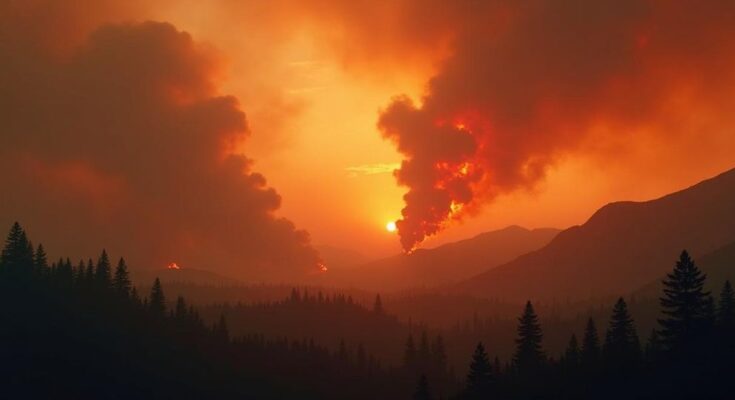The Amazon rainforest in South America is engulfed in severe wildfires, leading to smoke-filled skies and health crises among local populations. The situation is exacerbated by droughts linked to climate change, with widespread implications across multiple countries. Health officials and scientists stress the urgent need for global action to address the environmental crisis.
The Amazon rainforest, specifically in the region of Rondônia, Brazil, is currently experiencing a severe environmental crisis, characterized by widespread wildfires that have transformed its once-clear skies into hazy, smoke-filled expanses. The anthem of Rondônia, which proudly declares itself to have a “forever blue” sky, stands in stark contrast to the reality that persists today, as smoke from significant wildfires blankets vast areas of South America, extending their impact from Ecuador to Paraguay. In recent months, the air quality in major cities like Porto Velho, the capital of Rondônia, has deteriorated sharply, leading to disrupted air traffic and school closures. Health professionals, including Dr. Lilian Samara de Melo Lima, have reported an alarming increase in patients suffering from respiratory issues, migraines, and eye irritations. Dr. Lima lamented the unprecedented level of smoke this year, attributing the devastation to humanity’s reckless exploitation of previously untouched jungles. The situation is dire not only in Brazil but also across the continent. Erika Berenguer, a scientist from Oxford University, highlighted that satellite data has revealed unprecedented fire activity across countries like Colombia and Venezuela due to a combination of severe drought and exacerbated climate conditions. Paraguay’s Chaco forest has suffered significantly, with over 180,000 hectares of land consumed by fires, raising concerns for local communities and the environment alike. In Peru, the situation has reached a critical point, resulting in states of emergency in numerous regions. Here, the fires have claimed numerous lives and destroyed vast areas of the Andes and Amazon, as authorities contend with the practical implications of responding to these widespread disasters. While Prime Minister Gustavo Adrianzén has controversially blamed traditional agricultural practices for the fires, experts argue that many have been intentionally ignited for illegal agricultural expansion. Further east, in Bolivia, President Luis Arce has acknowledged a national disaster as millions of hectares of forest have succumbed to the flames, constituting the worst environmental crisis in the nation’s history. As the crises unfold, health officials like Marilene Penati express profound concern about what these events indicate for the planet, emphasizing the urgent need for global awareness and change in our environmental practices.
The article discusses the increasing intensity and frequency of wildfires across South America, particularly focusing on the Amazon rainforest, which is facing severe ecological destruction. The natural phenomenon known as El Niño is cited as a contributing factor to the drought conditions that exacerbate these fires. The piece underscores the human activities that have sparked these fires, including agricultural expansion and illegal land clearing, and highlights the detrimental effects on local populations’ health and well-being. Experts in the field, such as scientists and health officials, are calling attention to the broader implications of these fires as a manifestation of a global climate crisis requiring immediate collective action.
The ongoing wildfires across South America, particularly in the Amazon region, signify a critical environmental emergency resulting from a combination of climate change and human activities. Communities are experiencing severe health impacts, and ecosystems are being ravaged, leading to questions about sustainable practices and the need for urgent global responses. With increasing instances of drought and fires, it is imperative that both national and international communities heed the warnings of scientists and health professionals alike, recognizing the intrinsic link between human actions and ecological health.
Original Source: www.theguardian.com




